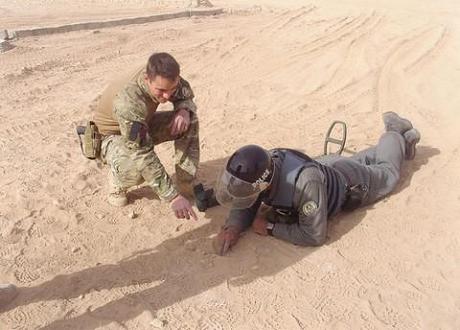
Co-operation? Training Afghan police. Photocredit: isafmedia http://www.flickr.com/photos/isafmedia/5292527289/sizes/m/in/photostream/
A US soldier has shot dead 16 civilians, including nine children, in an apparent lone killing spree in the Kandahar province of Afghanistan. Reports indicate the as-yet-unnamed soldier left a military base in the early hours of Sunday morning and attacked three houses in nearby villages as families slept; he later turned himself in to NATO authorities. According to The Independent, there were indications some of the bodies had been burnt.
The killings come at a time of heightened tension in Afghanistan. In February, the discovery that US soldiers had burned copies of the Koran provoked a wave of violence, leaving 30 Afghans and six soldiers dead.
US officials were quick to react, with American Commander in Afghanistan General John Allen promising a thorough investigation. But will this be enough to prevent retaliation in the days ahead, or is further bloodshed inevitable? As UK Prime Minister David Cameron and US President Barack Obama prepare to meet to discuss the future of coalition military involvement in Afghanistan, there are fears the Kandahar killings could jeopardise the chance of troop withdrawal.
Bleak future. The Kandahar killings show that “the efforts of thousands of people over many years at a cost of billions can be undone in a few seconds by the actions of a single, hate-addled individual”, wrote Julian Borger in The Guardian. According to Borger, there is a serious “trust deficit” in Afghanistan on both sides, fueled by incidents such as the US Koran-burning scandal and the murder of NATO military trainers by Afghans. The mass killing may well prove the final nail in the coffin of US plans to withdraw from a combat role in the country over the next two years. “Handing over security to Kabul without triggering an all-out civil war, with casualties measured in the tens or hundreds of thousands, would right now count as a success,” Borger said.
“This incident is tragic and shocking, and does not represent the exceptional character of our military and the respect that the United States has for the people of Afghanistan,” said US President Barack Obama, reported The Independent.
Propaganda. Both the Koran-burning and the killings in Kandahar are “an immense propaganda boost to the insurgents and add to the alienation of the population, many of whom are susceptible to conspiracy theories of foreign forces secretly engineering these treacherous acts”, said Kim Sengupta in The Independent. And there is a perception in the West that Afghan President Hamid Karzai is doing little to calm the situation, after he described the killings as “intentional murders by US forces”. This may be linked to Karzai’s desire to run for a third term as president: “Being seen to be standing up to the West, his supporters believe, will do him no harm,” Sengupta wrote.
“Some villagers reported that more than one US soldier was involved, but Afghan officials and the Nato-led coalition said they believed the killer worked alone,” said The Guardian.
Why didn’t the US see this coming? “Whatever led to Saturday night’s killing, the reality is that we will never be able to guard completely against horrific aberrations such as this,” wrote Colonel Richard Kemp, former British Commander in Afghanistan, in The Times (£). Kemp argued that troops in war zones are subject to unimaginable psychological pressure, and that it is not always possible to know when a soldier has reached breaking point. “I have known soldiers who one day appeared happy and well-adjusted; the next day they shot themselves with their own assault rifles,” Kemp revealed.
“[The soldier’s] motives are unclear – there is speculation that he might have been drunk or suffered a mental breakdown. But officers are worried that the attack might have been planned,” said the BBC.
Time to go. Writing in The Daily Mail after six British soldiers were killed in Afghanistan on 6th March, Michael Burleigh insisted that it is time for troops to withdraw from the country: “We are dealing with savages, who are not interested in the armed social workers we dispatch there to ensure that girls can go to school,” he spat. Burleigh dismissed the British government’s claim that security in Afghanistan is crucial to security in the UK: “We need to stop meddling in an ineffectual post-colonial way, in societies whose depravity and barbarity we cannot acknowledge for the usual PC reasons.”

